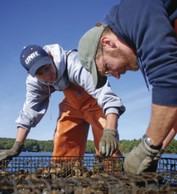STILLPOINT Archive: last updated 07/01/2013
By Mac Gostow ’13
“Gordon is where I first cultivated my environmental ethic.”
After 13 years at an office job in Boston, a close friend’s suggestion prompted Jay Baker ’95 to leave his old life behind and found Fat Dog Shellfish, an oyster farm in New Hampshire’s Great Bay. “Gordon is where I first cultivated my environmental ethic,” he says. During a summer environmental studies program at the Au Sable Institute in Michigan, Baker’s passion for environmentally sustainable practices and industries was solidified. After graduating, he worked as a technician for a wildlife program at Crane Beach in Ipswich. Soon thereafter he earned an M.A. in environmental coastal management from Duke University. He went on to serve as Director of the Massachusetts Bay National Estuary Program.
His call to a more venturesome life became apparent when he learned about aquaculture—the farming of aquatic organisms like shellfish. Shellfish are filter feeders and pump gallons of water through their tiny gills, removing hazardous phytoplankton that would otherwise disrupt the water column. The waterways along the eastern seaboard suffer from overabundance of harmful nutrients, which cause excessive algae blooms and a loss of habitats for many kinds of marine life. By farming shellfish, Jay and Fat Dog Shellfish help clean coastal waters, preserving marine habitats and enabling a diversity of species to thrive.
Baker and his partners buy 1.5 millimeter seed oysters from a hatchery, tend them in a nursery system called an updweller, and, when the tiny oysters have grown to about 1 centimeter, move them into cages a few inches above the silt of the seabed. It takes three years in all for an oyster to grow into a full-sized, restaurant-ready 3" select. Fat Dog Shellfish will reap its first crop this summer, selling the harvest to wholesale chains, local restaurants and friends.
The recent severe New England winter took some toll on Fat Dog’s oyster beds. Storm after storm pummeled the coast, and at times Great Bay was covered shore to shore with drifting snow and ice; occasionally, ice floes completely pulverized an oyster cage. But oysters are dormant in the winter, and Fat Dog’s “farm” cages are placed deep enough that routine sea ice does no damage.
Baker seeks to expand Fat Dog in the near future; he would like to broaden the company’s species diversity to include seaweed and clams, and he hopes to provide summer internships to Gordon students interested in marine biology.
Why the name “Fat Dog”? Both founders of the business had what Jay terms “beloved, over-nourished retrievers,” and when it came time to decide on a business name, fat dogs Walter and Jake came to mind. Chefs tell them Fat Dog Shellfish will look great on a menu.
Mac Gostow is a communications arts major, co-founder of ScotRadio, and performer with the Sweaty-Toothed Madmen improv troupe. He has interned with CBS News and been a radio host in Istanbul, Turkey.
[email protected]
